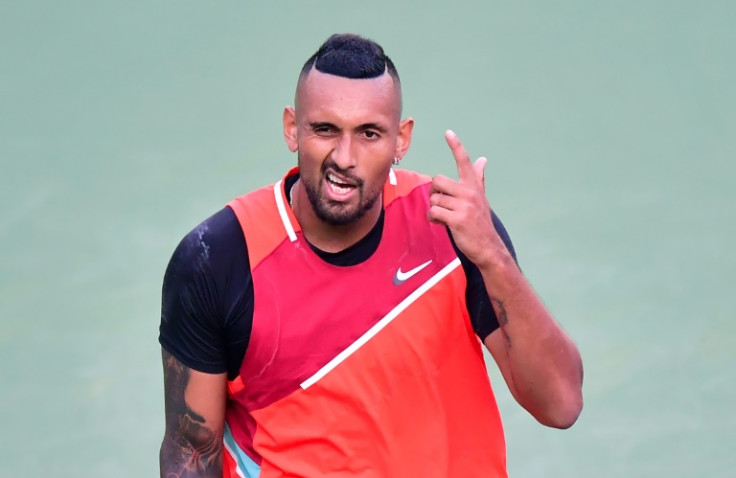Nick Kyrgios Reveals How Andy Murray Offered Support During Mental Health Crisis
The Australian says Murray spotted that he was self-harming during one of the lowest points of his mental health struggles.

Tennis legend Andy Murray is well-loved by tennis fans all over the world, but it turns out that another athlete is a big admirer. Australian star Nick Kyrgios has revealed that Murray has offered him support on tour especially while he was dealing with his personal demons.
Kyrgios opened up about his mental health struggles on "Piers Morgan Uncensored" and shared that Murray intervened after the latter noticed that he was self-harming. At that point, he had been on a toxic phase of self-destruction for at least 18 months.
The Australian has become more open about his struggles in recent years, but he has only just opened up about his unique relationship with Murray. Apparently, they have forged a bond since he first entered the tour and the Scottish star decided to look out for him.
During the conversation with Morgan, Kyrgios said: "Andy was always a big supporter of me. As soon as I came on the tour, he kind of saw a work in progress and took me under his wing. Then he realised later in my career that I don't think I was coachable or I was on my own path, but he was always someone that was looking out for me."
"He took me under his wing... I thank him a lot."
— Piers Morgan Uncensored (@PiersUncensored) December 1, 2023
Nick Kyrgios tells Piers Morgan how Andy Murray helped him with mental health and self harm struggles.
Watch the full interview on tonight's Uncensored at 8pm (UK). @NickKyrgios | @andy_murray | @piersmorgan | #PMU pic.twitter.com/VYpAdQBVKL
Indeed, Kyrgios is known as a stubborn hothead on tour, and he has clashed with fellow players and match officials on numerous occasions. Nevertheless, he says that Murray saw past his "bad boy" persona and offered him support especially during his darkest days.
He spoke about the time when he was drawn into a pattern of harming himself, and he was unable to shake it off. He said that he refused to listen to anybody at that time, but he now acknowledges that Murray's decision to say something about it has left an impression on him.
"He saw it [the self-harm] and he said, 'What's that on your arm?' It was pretty bad at that stage. Andy obviously was trying to give me advice on it. But I was just so stuck in my ways at that time that I didn't listen. Obviously I'm very thankful. I thank him a lot," said Kyrgios.
He added that even if he was enjoying a successful run on court, he actually "hated himself" at that time and he was in a dark place. He said that he "hated waking up as Nick Kyrgios" and ended up getting addicted to the pain that he was inflicting upon himself.
"I won tournaments on the professional tour, drinking every night, self-harming, burning things on my arm, cutting myself for fun," he said. In fact, many of his fans did not know that he was wearing a compression sleeve during Wimbledon in 2019 because he was using it to cover the marks caused by his habit of self-harming.
It took him a long time to be able to pull himself out of his lowest point, but he admits that it is a work in progress and that he sees himself as someone that others can relate to. "I've almost been a beacon for people who are struggling. When they feel like they're overwhelmed and they're going towards drinking, drugs and stuff, they open up and they feel like I'm relatable," he told Morgan.
Indeed, he has since gotten back on tour and reached his first Grand Slam final at Wimbledon in 2022. He lost out to Novak Djokovic in four sets, but it was a display of his resurgence after having previously been on the verge of retirement.
Now, Kyrgios sees a new purpose in his career other than winning tournaments. He shared that he regularly speaks to fans who are going through the same struggles that he went through and he offers them support as much as he can.
"That's been the most powerful thing in my career; people coming to me with genuine issues. They send me photos in my Instagram, direct messages, self-harming and genuinely wanting to commit suicide. I have conversations with these people. Sometimes I've had phone calls with these people. That's making a real difference and I'm just really proud."
If you or someone you know is having thoughts about suicide, the Samaritans provide a free support service for those who need to talk to someone in the UK and Republic of Ireland. Visit Samaritans.org or call 116 123 (UK) or 116 123 (ROI), 24 hours a day, 365 days a year. Visit this website to find a support phone number in your country.
© Copyright IBTimes 2025. All rights reserved.






















